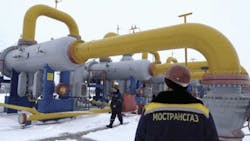MOSCOW -- Russia's third-quarter growth fell far short of recent government targets on Tuesday in a blow to President Vladimir Putin's hopes of avoiding a new era of economic stagnation.
The state statistics committee said the economy expanded at an annual rate of 1.2% between July and September. That is the slowest growth among the big emerging markets and less than half the pace in the United States.
The annual rate was the same as in the second quarter and slower than the 1.6% rise witnessed in the first three months of the year.
The committee's report confirmed an earlier finance ministry estimate and was just a fraction of the figure of 3% or better envisioned by the government in the summer. Both the government and economists had expected Russia's output to pick up in the second half of the year and reach an annual rate of at least 1.8%.
"This is a bad surprise because we anticipated that growth would increase in the second half of the year," said Alfa Bank economist Natalia Orlova. "It is not clear how the government thinks it can sustain growth and maintain competitiveness," she said.
Putin had initially promised a 5% rise in 2013 -- an outcome that was meant to improve on the 3.4% to 4% yearly performances witnessed between 2010 and 2012.
Analysts at Bank of America Merill Lynch have attributed the latest disappointment to a poor harvest that was damaged by one of the wettest autumns in years.
Capital Economic also pointed out that "there is still little evidence of a much-needed shift away from an excessive reliance on consumer spending and towards greater investment."
The state statistics committee report came out days after Economy Minister Alexei Ulyukayev warned that Russia faced 17 more years of low growth because of the Kremlin's failure to pursue reforms when oil prices were high. Ulyukayev cautioned that "the average rise in gross domestic product will range between 2.5% 3% until 2025."
He said this will be followed by "a certain drop-off in the last five years" that will see the annual rate through 2030 reach 2.5%.
Economics of Energy
Putin's governments have been blamed repeatedly for failing to introduce a business-friendly climate that weeds out corruption and induces investments in industries that could wean Russia off its dependence on energy exports.
Russia's oil and natural gas sector accounts for nearly a quarter of gross domestic product and about a third of its budget revenues.
But a ballooning bureaucracy and inefficient state spending have seen the price of oil at which the budget can stay balanced more than double in the past five years and reach more than $100 per barrel.
Ulyukayev predicted that Russia's growth would lag the world average at least until 2030 -- a remarkable turnaround from the seven-plus percent yearly figures enjoyed during Putin's first terms between 2000 and 2008.
Economists at Moscow's Sberbank said that that even their most optimistic models were based on the assumption that Russia would continue relying on oil and gas sales.
"Russia's economic model will not undergo significant changes under any of our scenarios," Sberbank said in a report.
The economy "will keep its natural resource focus, with a fairly high concentration of production and a significant government presence," Russia's largest bank said.
- Dmitry ZAKS, AFP
Copyright Agence France-Presse, 2013
About the Author
Agence France-Presse
Copyright Agence France-Presse, 2002-2025. AFP text, photos, graphics and logos shall not be reproduced, published, broadcast, rewritten for broadcast or publication or redistributed directly or indirectly in any medium. AFP shall not be held liable for any delays, inaccuracies, errors or omissions in any AFP content, or for any actions taken in consequence.
